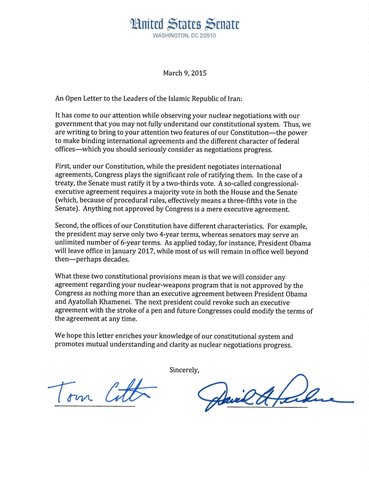Since the beginning of the Presidency, Article II of the Constitution gives wide parameters for the President to handle America's foreign policy. Nominating our Ambassadors, recognizing those from other countries, to determining as Commander In Chief the Country's stance when it comes to military engagement (or not). Since the administration of George Washington, no interference into Foreign Policy is expected or tolerated from a meddling Congress - except for the delegated powers under the Constitution, which are limited to confirming nominations of ambassadors, ratifying treaties (Senate only) and funding the Department of State (under which our foreign affairs are administered on a day to day basis). Other than funding, confirmations and ratifications, there are no Constitutional powers granted to the Senate that would interfere with the broad delegated and implied powers of the President (including those as Commander In Chief).
Also since George Washington, there have been multiple critics of a President's foreign policy. Washington (as did Adams) chose to have America remain neutral early on when England and France went to war, irritating Thomas Jefferson and his followers. Woodrow Wilson kept America out of the First World War until he felt we were prepared to win the peace, yet many in the Senate objected to his strategy (including the powerful GOP leader Henry Cabot Lodge, who subsequently led the defeat of the ratification of the Treaty of Versailles). The difference today? Neither of these opponents of Presidential action used their collective positions in the Senate to communicate directly in any official capacity with an enemy or any other foreign power currently negotiating policy with a sitting President. None! In fact, it was a time-worn tradition that disputes over the handling of foreign policy always ended at the "waters' edge" - in other words, internal argument was fine, but extending it to criticism along with direct intervention, well is unheard of...until the recent move by the Senate GOP. And the result of this intervention? You guessed it, GOP over-reach and scorn. In fact, over 150,000 Americans have signed petitions to charge those Republican Senators with treason (See http://news.yahoo.com/150-000-sign-treason-petition-us-republican-letter-195011270.html).
The GOP response to the backlash from such a letter? Some GOP signees of the letter have expressed regret, wishing instead the letter was not addressed to Iran but instead be considered an "open letter" of criticism of Obama. But that dog won't hunt. In typical Republican action, instead of using a "trial balloon" to see if such a scheme would "fly" with the American people, they went as predicted into full speed ahead mode directly into a fire storm of criticism and rebuke. I say predicted because I warned my students the new GOP leadership of the Senate would overreach in their effort to attack Obama. Now I will enjoy using this event as a "teachable moment" to my students (who know full well the extent of authority granted to Congress under Article I and the President under Article II of the Constitution).
So, many thanks to the 47 GOP Senators (including Florida's very own Marco "Not Ready For Prime Time" Rubio) for putting your hatred of Obama ahead of Constitutional law and Custom and Usage when it comes to Presidential authority to oversee and implement foreign policy for the United States. You have proven once again that Political Science is not Rocket Science and actions of those in power are as predictable as the rising sun. As President Woodrow Wilson once wrote: "One cool judgment is worth a thousand hasty counsels. The thing to do is to supply light and not heat." The heat produced by the GOP for its Un-American interference with America's foreign policy is going to sting a bit, and the heat it has caused might very well leave some scars from its burns. Have a great week.

 RSS Feed
RSS Feed
